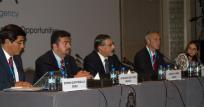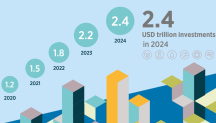

Leaders Discuss How to "Tap" Renewable Energy Resources in Latin America
Newsletter
Today in Abu Dhabi, government leaders and organizational representatives from across Latin America met to discuss scaling up renewable energy in the region. Energy demands in Latin America are expected to increase 30% by 2030, a need that can be met by renewable energy says IRENA Director-General Adnan Z. Amin:
“We are following attentively the energy developments in the region, which is closely linked with the positive trajectory in the growth of the Latin American economies. The region is endowed with vast renewable energy resources, and while renewables already contribute significantly to the primary energy supply mix in the form of hydropower and bio energy, the potential is still not fully utilized.”
IRENA’s REmap2030 report suggests that renewable energy in Latin America can increase 240% by 2030. Despite the renewable energy potential, the region relies heavily on fossil fuel-based thermal generation, while wind and solar energy resources remain largely untapped. Latin America has some of the best wind resources in the world, and a number of markets, such as Brazil, Chile, Mexico, Uruguay, Nicaragua and Panama are emerging strongly.
The session presented a working paper on renewable energy in Latin America, which will be edited based on today's outcomes and published as a report later this year.
The paper highlighted that Latin American countries, compared to the OECD, have a lower energy consumption per capita, however the growth rate is higher, and energy intensity has not changed much in the last 5 years. This means that energy consumption will increase greatly in the coming years, which will strain the existing energy production systems.
Some of the challenges that must in the region include:
- developing a business case for renewable energy technologies vis-à-vis competing energy resources;
- creating enabling regulatory and administrative frameworks to promote investment;
- addressing infrastructure constraints (including the expansion of electricity transmission networks to access remote sources of renewable electricity); and
- tackling technical challenges of scaling-up of renewables, including institutional capacity building, lack of data on renewable energy potential, lack of technological standards and norms and issues with certification of equipment.
Uruguay, Costa Rica, Mexico, Peru, IGA and OLADE (Latin America Energy Organization) were among those involved in the discussion.
IRENA is involved in a number of activities to help develop the untapped renewable energy capacity in the Latin America region. A Renewables Readiness Assessments (RRA) was completed for Peru last year, and an RRA for Nicaragua will be released soon. IRENA’s REmap2030 report also considered large Latin American economies including Ecuador, Brazil and Mexico.
Further discussions on scaling up global renewable energy expansion continue tomorrow, with the start of IRENA's fifth Assembly.




